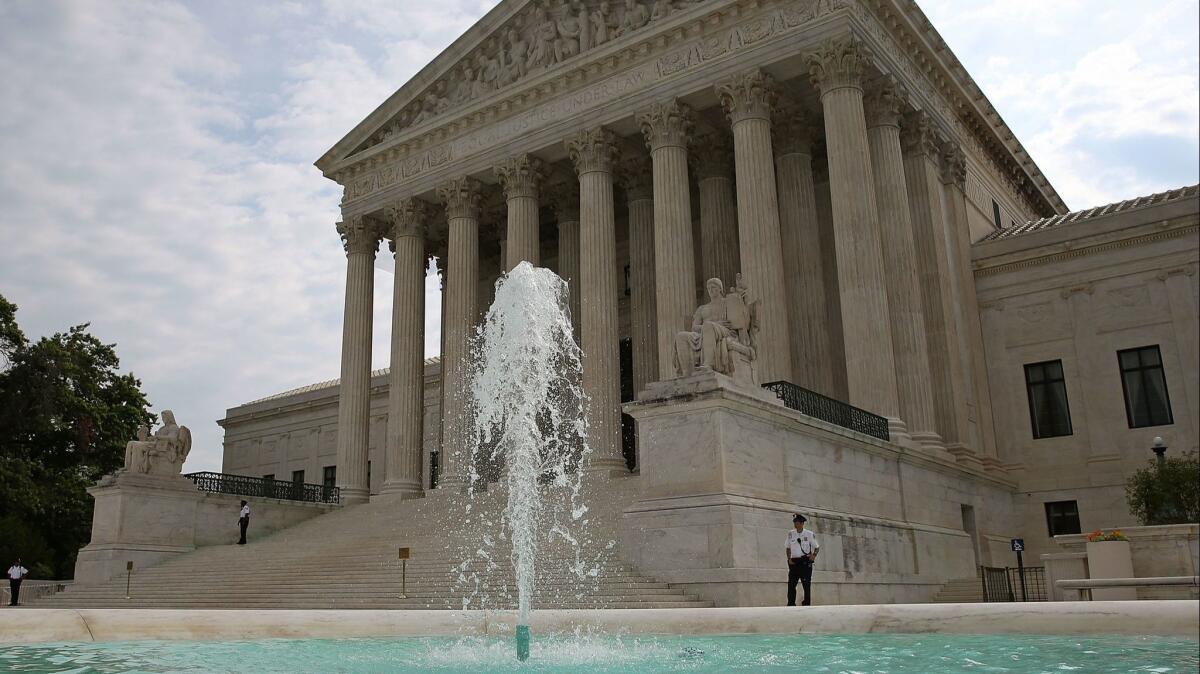Supreme Court clears the way for lawsuit over Newport Beach police shooting

- Share via
Reporting from Washington — The Supreme Court refused Monday to block an excessive force suit against the city of Newport Beach, clearing the way for a jury to decide whether the police are liable for shooting and killing a mentally ill young man who came running at them holding a pair of scissors.
The justices refused to shield the police from the lawsuit brought by the parents of Gerrit Vos, who died in 2014.
Last year, the 9th Circuit, in a 2-1 decision, revived a lawsuit brought by the parents and said a jury should decide whether the police faced an “immediate threat” that justified the shooting outside a convenience store in Newport Beach. In addition, the appeals court said the jury should consider whether officers should have used extra caution because the man was mentally ill.
The Americans With Disabilities Act requires public agencies to accommodate people with mental or physical disabilities, and the 9th Circuit has said that law applies to arrests.
Early last year, the court drew criticism from legal scholars and the Cato Institute for repeatedly granting the police immunity from being sued for shooting innocent people. Federal civil rights law says government officials, including the police, can be sued for violating a person’s constitutional rights, including the right against an unreasonable use of force. But the justices said the police could not be sued unless it was “beyond debate” that their conduct violated the law.
In one such case, they tossed out a suit brought by an Arizona woman who was shot four times in her front yard because she was holding a large kitchen knife in a way that an officer saw as threatening.
But the criticism may have had some impact. They then allowed a Somona County police officer to be sued for shooting a 13-year boy who was carrying a pellet gun that he mistook for an assault rifle. Two months ago, the justices let stand a $4-million verdict against two Los Angeles County sheriff’s deputies who shot and wounded a couple sleeping in a shed. The officers had been searching for a fugitive in the area.
In its appeal, Newport Beach asked the court to clarify whether officers must “provide accommodations to an armed, violent and mentally ill suspect” when making an arrest.
The city cited a 9th Circuit Court decision that had relied on the federal disabilities law in clearing the way for a mentally ill San Francisco woman to sue two police officers who forced their way into her kitchen in a group home and then shot her when she brandished a knife. The justices tossed out most of her lawsuit, but did not rule on whether the disability act applied.
Lawyers for Newport Beach referred to that case and urged the high court to block the Vos suit. But the court issued a one-line order Monday saying it would not hear the case of Newport Beach vs. Vos.
The incident began on the evening of May 29, 2014, when Vos, a 22-year-old hairdresser from San Clemente, was shouting and cursing in a 7-Eleven store. The police were called and were told the man was agitated and angry and might be under the influence of drugs. The customers and clerks escaped from the store, and one reported he had been cut on the hand by scissors wielded by the disturbed man.
Within 20 minutes, eight officers took places positioned outside behind two police cars. They had a police dog with them and non-lethal weapons, but two officers were armed with AR-15 rifles. When Vos came running out of the store, he was shot four times and died from the wounds. His blood tested positive for methamphetamine, and his medical history revealed he had been diagnosed as schizophrenic.
His parents, Richard Vos and Jenelle Bernacchi, filed a $25-million lawsuit against Newport Beach and the city’s police, alleging they used “excessive, unwarranted and brutal” force in killing their son. Their suit included claims based on the 4th Amendment’s ban on unreasonable seizures as well as a violation of the federal disabilities law. They said the police should have tried “de-escalation and communication.”
A federal district judge ruled for the city and dismissed the suit. The 9th Circuit revived the claims against the city, but not against the individual officers, and said a jury should decide whether the use of force was reasonable or excessive. “Here the facts are such that a reasonable jury could conclude that Vos was not an immediate threat to the officers,” the majority said. They “had surrounded the front door to the 7-Eleven, had established positions behind cover of their police vehicles and outnumbered Vos eight to one. … They did not believe he had a gun, and the officers had less lethal methods available to stop Vos from charging.”
The dissenting judge said the police had only seconds to react.
In their appeal, lawyers for the city highlighted the issue of whether police officers must make “reasonable accommodations” for a knife-wielding suspect who might be mentally ill.
“Municipalities and law enforcement officers throughout the nation should know whether, when faced with that peril, they must consider not only the 4th Amendment’s restrictions on use of force, but also whether they are providing reasonable accommodations to the attacking suspect,” they said.
The justices considered the appeal for five weeks before turning it down without comment. This would not prevent the high court from hearing the case at a later date if a jury were to hand down a large verdict against the city.
More stories from David G. Savage »
More to Read
Get the L.A. Times Politics newsletter
Deeply reported insights into legislation, politics and policy from Sacramento, Washington and beyond. In your inbox twice per week.
You may occasionally receive promotional content from the Los Angeles Times.










